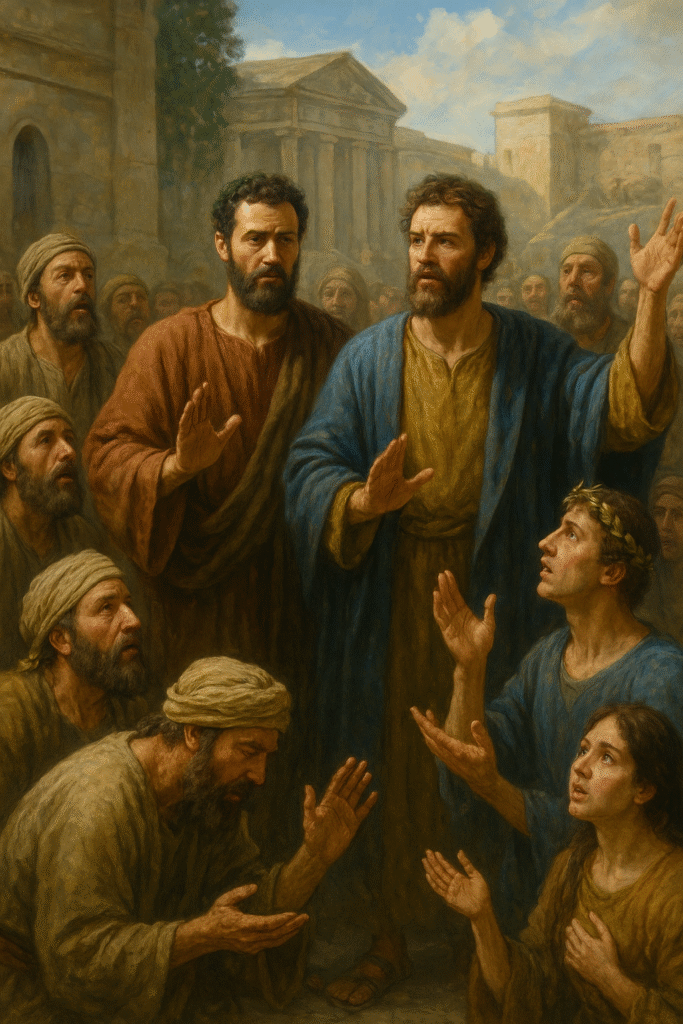Acts 14 - Strength for the Work

Acts 14 continues the account of Paul and Barnabas on their first missionary journey. This chapter records both great spiritual breakthroughs and intense opposition, reminding us that the work of God often advances through pressure, perseverance, and grace.
Acts 14:1
Paul and Barnabas entered the synagogue in Iconium and spoke in a way that led many Jews and Greeks to believe. This follows the same pattern we saw in Antioch. They began with the synagogue because the Jews already regarded the Scriptures as the Word of God. It was the natural starting point for proclaiming the Messiah.
However, as always, when the Word is received by some, it is resisted by others.
Acts 14:2- 3
Unbelieving Jews stirred up the Gentiles against Paul and Barnabas. Yet God responded by giving the apostles boldness while confirming the truth of the message through signs and wonders. Spiritual opposition is not proof of failure. Many times opposition shows that the work of God is taking root.
Acts 14:4
Both Paul and Barnabas are called apostles. The word means sent ones. In a technical sense it refers to those specifically chosen and commissioned by Christ for the proclamation of the gospel. Paul understood his calling as an apostle in this sense because he had seen the risen Christ and been appointed by Him. Ministry is not casual. It is a calling.
Acts 14:8 to 10
In Lystra, a city without a synagogue and filled mostly with Gentiles, Paul met a man crippled from birth. The Holy Spirit enabled Paul to perceive that the man had faith to be healed. Paul commanded him to stand and the man rose instantly.
This miracle was not only a physical restoration. It was a public sign that God was at work through these messengers.
Acts 14:11 – 13 — The Worship Confusion
The people of Lystra reacted in a surprising way. Speaking in their native Lycaonian language, they declared that the gods had come down in the likeness of men. They called Barnabas Zeus and Paul Hermes. A local priest ran to the gate with oxen and garlands to offer sacrifice.
This moment deserves careful reflection. The crowd’s response reveals how easily people can mistake the messenger for the source of power. The miracle pointed to God, but the people saw the immediate instruments of grace and reached for objects of worship. Their reaction also shows how religious imagination interprets power through familiar cultural frames. They did not yet know the God who acts, so they translated the event into what made sense to them — pagan categories of gods and heroes.
Paul and Barnabas were quick to correct them. They tore their garments in horror at the idea that they should be worshiped. They urged the people to turn from worthless idols and to worship the living God who made heaven and earth. Their response models humility, theological clarity, and pastoral urgency. When God works through us, our role is never to claim glory. It is to point people back to the Creator.
This episode also reminds us to examine how we and our communities respond to spiritual experiences. Do we point people to Jesus, or do we elevate the messenger, the experience, or our tradition? True worship always redirects glory to God.
Acts 14:17
Paul went on to say that God has not left Himself without witness. The rain, the seasons, the food we eat, and the joy of ordinary life are signs of God’s goodness. Even in a pagan town, the fingerprints of God were visible. This is the beginning of Paul’s approach to Gentile audiences, later developed in his speech at Mars Hill.
Acts 14:19 to 20
Those same crowds later turned violent. Jews from neighboring cities stirred up the mob. Paul was stoned, dragged out of the city, and left for dead. But the next day he rose and returned to the city. He refused to let violence end the mission.
This is a picture of resilience that only the Spirit can produce. Paul had been severely beaten, but he continued. His courage shows that the mission matters more than comfort.
Acts 14:21- 23
Paul and Barnabas went on to Derbe, then retraced their steps through Lystra, Iconium, and Antioch. They strengthened disciples, appointed elders in every church, and encouraged believers to remain steadfast in the faith. Structure, leadership, and pastoral care followed evangelism. Planting churches requires both evangelistic power and wise organization.
Acts 14:24 to 28
They returned to Antioch and reported all that God had done among the Gentiles. Their journey closed with worship and thanksgiving. The mission had been costly. It had been risky. It had also been fruitful.
Prayer
Father, thank You for the example of Paul and Barnabas.
Thank You that You confirm Your word with power and that You open doors even in hard places.
Give us humility when people praise what You do through us. Teach us to point every heart to You.
Fill us with courage when opposition comes. Strengthen us to return to the places where we were once rejected and to build up the saints.
Help our churches to be both bold in witness and wise in leadership.
Use us to spread Your Word to the ends of the earth. In Jesus name, Amen.
